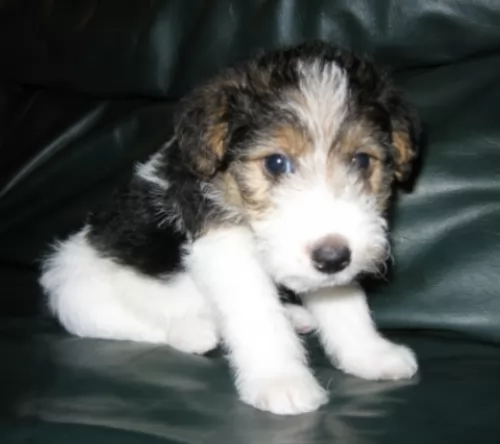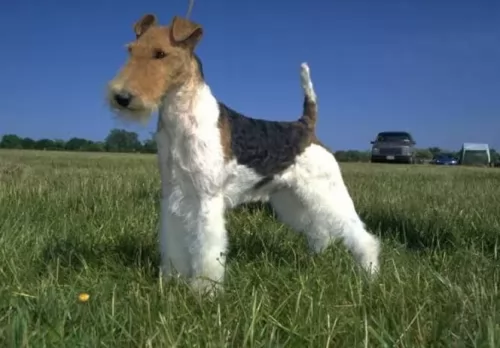 Petzlover
Petzlover Hungarian Wirehaired Vizsla is originated from Hungary but Wire Haired Fox Terrier is originated from United Kingdom. Hungarian Wirehaired Vizsla may grow 26 cm / 11 inches higher than Wire Haired Fox Terrier. Hungarian Wirehaired Vizsla may weigh 41 kg / 91 pounds more than Wire Haired Fox Terrier. Both Hungarian Wirehaired Vizsla and Wire Haired Fox Terrier has almost same life span. Hungarian Wirehaired Vizsla may have more litter size than Wire Haired Fox Terrier. Hungarian Wirehaired Vizsla requires Low Maintenance. But Wire Haired Fox Terrier requires Moderate Maintenance
Hungarian Wirehaired Vizsla is originated from Hungary but Wire Haired Fox Terrier is originated from United Kingdom. Hungarian Wirehaired Vizsla may grow 26 cm / 11 inches higher than Wire Haired Fox Terrier. Hungarian Wirehaired Vizsla may weigh 41 kg / 91 pounds more than Wire Haired Fox Terrier. Both Hungarian Wirehaired Vizsla and Wire Haired Fox Terrier has almost same life span. Hungarian Wirehaired Vizsla may have more litter size than Wire Haired Fox Terrier. Hungarian Wirehaired Vizsla requires Low Maintenance. But Wire Haired Fox Terrier requires Moderate Maintenance
 In the 1930’s some breeders noticed that the Hungarian Vizsla produced some dogs with more water, cold weather and ground cover protection because they had a much thicker coat than most of the breed. One breeder decided to cross one of these females with a German Wirehaired Pointer, thus producing the first Hungarian Wirehaired Vizsla. There were now three types of Vizsla – the smooth coated, the longhaired, and the wirehaired. The longhaired is very rare and can be either smooth or wirehaired. It is also believed based on anecdotal evidence that the original Wirehaired Vizsla was also mixed with the Bloodhound, Pudelpointer, and Irish Setter during World War II. Many kennels started breeding the Wirehaired Vizsla at this time.
In the 1930’s some breeders noticed that the Hungarian Vizsla produced some dogs with more water, cold weather and ground cover protection because they had a much thicker coat than most of the breed. One breeder decided to cross one of these females with a German Wirehaired Pointer, thus producing the first Hungarian Wirehaired Vizsla. There were now three types of Vizsla – the smooth coated, the longhaired, and the wirehaired. The longhaired is very rare and can be either smooth or wirehaired. It is also believed based on anecdotal evidence that the original Wirehaired Vizsla was also mixed with the Bloodhound, Pudelpointer, and Irish Setter during World War II. Many kennels started breeding the Wirehaired Vizsla at this time.
This rare longhaired is not recognized by any official club or organization while the smooth and the wired are recognized as two separate breeds. There are only a few longhaired Vizsla and they are only found in Europe. The Wirehaired Vizsla was recognized in 1986 by the FCI in Europe and in 2014 by the AKC (American Kennel Club).
Like their cousins the smooth Hungarian Vizsla, the wirehaired version is a natural hunter and easily trained. They are great retrievers as well as pointers in the water or on the land. Their wirehair coats offer them more protection than their smooth coated cousins. They love to swim and are very good at it and will even use your back yard pool if it is available to them.
The wirehaired Vizsla came to North America in the 1970’s and was recognized by the CKC (Canadian Kennel Club) in 1977, The North American Versatile Hunting Dog Association (NAVHDA) by 1986 and in 2006 by the United Kennel Club (UKC). The Australian Nation Kennel Council offered recognition in 2007 prior to their entrance into the AKC Foundation Stock Service. They began showing the breed at AKC events in Performance and Companionship, prior to their full AKC recognition in 2014.
These gentle hunting dogs became great family dogs as they love children and just want to be with their people. Falconers have recently taken up the breed because their temperament is suited to this work as well. There are only about 400 to 450 Wirehaired Vizslas left in the United States and few thousand across the globe.
 The Wire Haired Fox Terrier originates in England, and it is thought that the dog developed from the white English Terrier being crossed with the Bull Terrier and maybe even the Beagle.
The Wire Haired Fox Terrier originates in England, and it is thought that the dog developed from the white English Terrier being crossed with the Bull Terrier and maybe even the Beagle.
The hunting crowd wanted a dog that was small enough to disappear down a hole to flush out a fox.
Even though the Wire Haired Fox Terrier used to be a pet of Queen Victoria as well as King Edward VII, it only became popular as a family pet in the 1930s.
 Very much like his cousins, the Wirehaired Vizsla is a noble looking breed. He is lean and muscular with a noble head and moderate skull line. Their muzzle is just a little shorter than the skull and the end is squared. They have powerful jaws and a broad, wide nostrils. The nose is brown, and the eyes are slightly darker than the dog’s coat color.
Very much like his cousins, the Wirehaired Vizsla is a noble looking breed. He is lean and muscular with a noble head and moderate skull line. Their muzzle is just a little shorter than the skull and the end is squared. They have powerful jaws and a broad, wide nostrils. The nose is brown, and the eyes are slightly darker than the dog’s coat color.
Low set ears are long and hang near the cheeks. With a strong, long neck and muscular shoulders, the Wirehaired Vizsla certainly looks the part of a hunting dog. Her chest is a little deep and the breastbone is prominent. She has round paws with short nails. Of course, her coat is wiry and dense. The undercoat is water repellent. He has an intelligent and lively facial expression.
Their ears are long but proportionate to the head and body. Their upper teeth overlap the lower teeth. Finally, the tail is thick and usually 1/3 docked. The tail is mostly carried in a horizontal position while walking or running.
 The Wirehaired Fox Terrier is a medium-sized dog, standing at between 33 and 38cm in height and weighing between 6 and 9 kg.
The Wirehaired Fox Terrier is a medium-sized dog, standing at between 33 and 38cm in height and weighing between 6 and 9 kg.
The face is fairly long and he has semi-erect, semi-floppy ears and the high set tail is usually docked. The double coat is wiry, curly and coarse and is essentially white with tan or black markings. White is always the predominant color of the Wire Haired Fox Terrier.
This little dog is cheerful, cheeky, playful, feisty, lovable and full of the joys of life. He is also strong-willed and independent.
He makes a great playmate for kids and loves being in the company of his human family. He will get on well with other pets in the family too.
He is intelligent which means you can have him easily trained and socialized and the kids will love to teach him some tricks too. He is a high energy dog and will require a good dose of exercise.
 Very good with children as long as he gets enough exercise.
Very good with children as long as he gets enough exercise.
Very athletic
A puppy could live in an apartment in the city, but the adult dog needs a yard and is better off on a farm.
Very smart, very responsive, high learning ability.
 One thing is for sure – when you bring a Wire Haired Fox Terrier into your home, you’re going to have a dog with endless energy. It is why they make such good pets when you’ve got kids in the house.
One thing is for sure – when you bring a Wire Haired Fox Terrier into your home, you’re going to have a dog with endless energy. It is why they make such good pets when you’ve got kids in the house.
They like to please their owners and they respond well to training and socialization. They’re also brave and protective, making good watchdogs.
They’re loving, loyal and companionable, and there are plenty of stories about the loyalty of these dogs. Anyone who has had one of them as a pet will tell you what splendid dogs they are.
 Mostly healthy but the Hungarian Wirehaired Vizsla does have some inherited dispositions to:
Mostly healthy but the Hungarian Wirehaired Vizsla does have some inherited dispositions to:
 These robust little dogs can succumb to any one of the many common dog illnesses there are -
These robust little dogs can succumb to any one of the many common dog illnesses there are -
The Wirehaired Foxy is a healthy dog, but it is thought that Epilepsy could be a problem with this breed. Your spunky dog may seem a little bit confused before he falls to the floor lying on his side and twitching like he’s having a bad dream.
This is brought on by uncontrolled bursts of electrical activity in the dog’s brain. The seizure can last for a minute or so but even so, whether it is a twitch or violent shuddering, it can leave you shocked and disturbed.
He can sometimes even urinate during the seizure. It is imperative to get your pet to the vet who will know precisely how it can be controlled.
Dental disease is also a common problem with dogs and unfortunately, your Wire Haired Fox Terrier also battles with this. The problem starts with tartar build-up on the teeth and then it can cause infection of the gums and roots of the teeth.
Left unattended to, your pet could lose his teeth, and it jeopardizes your pet’s health as well.
 Feed high quality food for medium to large breed puppies. Feed 3-4 time a day 1-2 cups.
Feed high quality food for medium to large breed puppies. Feed 3-4 time a day 1-2 cups.
Feed high quality food for adult medium to large dogs. Feed 2x a day 2-3 cups.
Great stamina and very athletic breed.
The Wirehaired Vizsla is a working dog and needs serious daily exercise. He will be full of energy and excitement if he doesn’t get enough mental and physical stimulation. He needs a family that can walk a mole or two every day or jog with him. He easily becomes neurotic and high-strung if his energy is not dissipated. Excels at Field Trials, Competitive Obedience, tracking and Barn Hunt.
 Groom your pet. Brush twice weekly. Wire Haired Fox Terrier owners like to hand their pets in at professional groomers to have their hair cut short and made more manageable. The hair is kept quite long around the muzzle.
Groom your pet. Brush twice weekly. Wire Haired Fox Terrier owners like to hand their pets in at professional groomers to have their hair cut short and made more manageable. The hair is kept quite long around the muzzle.
Provide your pet with the best food there is. Always buy high quality food that can contribute to your pet’s health and which is suitable for his size, age and activity levels. The Wire Haired Fox Terrier is inclined to be a greedy dog and with a dog like this weight gain can slowly increase and can become a health problem.
Spay or Neuter. This is an excellent idea for your pet if you don’t want puppies. Not only that, spaying or neutering actually decreases the likelihood of your pet getting some types of cancer.